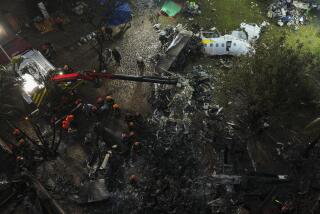World Leader in Accidents : Brazilians: Celebrated Racers Are Lethal on the Road
- Share via
RIO DE JANEIRO — On the race track, Brazil’s drivers are sublime. On the road they’re lethal.
Ayrton Senna’s victory in last year’s Formula One championship race, which now rivals even soccer as a television draw, showed how good a Brazilian can be behind the wheel.
Off the track and on normal roads, however, lives are in jeopardy. Brazil--with just one car for every 10 people--leads the world in traffic accidents.
50,000 Killed Annually
Each year, more than 50,000 people die on the roads and 350,000 are maimed. The figure, National Traffic Department engineer Marcelle Andrade has noted, is about the same as the number of Americans killed and wounded in the eight-year Vietnam War.
Brazil’s traffic death toll last year was about 3,000 higher than the United States’--which has 184 million cars and trucks, around 1.3 per person and more than 13 times as many vehicles as Brazil.
Driving in Brazil is not for the faint-hearted. Nelson Piquet of France, three-time Formula One world champion, has said: “Driving in Rio is more frightening than racing in a Grand Prix.”
A rush-hour drive down the eight-lane Avenida Brazil from central Rio’s makes the point.
Drivers pass on the inside or outside, cut into improbable gaps and roar along at twice the 50-m.p.h. speed limit.
Overloaded buses zoom through traffic at almost twice the speed limit of 38 m.p.h..
It is no better in the smart southern districts. Rio drivers explain they don’t stop at red lights at night for fear of being robbed. Perhaps it’s habit, but few stop at red lights during the day, either.
Part of the problem is the state of the roads in this vast country that makes up half of the South American continent.
Brazil has almost 870,000 miles of roads, and a recent survey of federal highways showed that one-quarter were in poor condition. With an economic crisis and massive foreign debt, the country has no money for road repairs.
The pothole-riddled Sao Paulo-Curitiba highway, economically important because it links the industrial capital to the agricultural south, is known as the “Highway of Death.”
About 10 accidents occur there every day. Crosses line the roadside as grim reminders of the danger.
Even in major cities such as Rio, the roads are pitted with holes--punishing for cars and drivers and a bonanza for mechanics and tire repair shops.
Overcrowding in the cities contributes to the problem.
Rio is particularly bad. Wedged between mountains and the sea, it has breathtaking beauty. But in Copacabana, where about 300,000 people live in high-rise housing on just over 100 streets, parking is an art.
One denizen wrote in the city’s English-language community’s newsletter: “If there were a way to park a car in a tree, the residents of Copacabana would have found it.”
Another cause of accidents is the condition of vehicles.
With no regular official inspections, Brazilian drivers often skimp on maintenance. Police say many cars have faulty brakes, bald tires and other mechanical faults. It is common to see cars on the road at night with no lights.
Faulty Mechanical Work
Even if a car is taken to a garage, mechanical work is not always what is expected.
One driver en route to work recently froze in shock when his steering wheel came off in his hand. A mechanic had forgotten to replace a bolt. He survived.
But official figures show drivers are the main culprits, accounting for half of all accidents.
Poor training, excessive speed and drinking are the most common mistakes. Driving tests are quite tough, but Brazilians say that until recently it was possible to pay for a license.
As a result, basic rules are ignored. Few drivers signal turns, and bad passing is one of the main killers.
A recent campaign--not the first--to enforce a safety belt rule has been widely ignored.
Brazilians also warn that it is not a good idea to argue on the road. Newspapers have carried reports of drivers shooting and even killing others in traffic disputes.
To try to reduce the accident rate and its $2-billion cost to Brazil, President Jose Sarney--with the backing of auto makers--has declared this “Brazilian Traffic Safety Year.”
But a quick poll of drivers in Rio showed few had heard of the safety year, and even fewer expected it to produce major changes.
A recent campaign to stop illegal parking in Rio’s wealthy suburbs, by using wheel boots, caused a revolt. The heavy clamps were smashed with wrenches and crowbars. Left with a pile of scrap metal, police dropped the campaign. Another campaign in Sao Paulo to ban alcohol sales in roadside bars was widely ignored.
More to Read
Sign up for Essential California
The most important California stories and recommendations in your inbox every morning.
You may occasionally receive promotional content from the Los Angeles Times.












